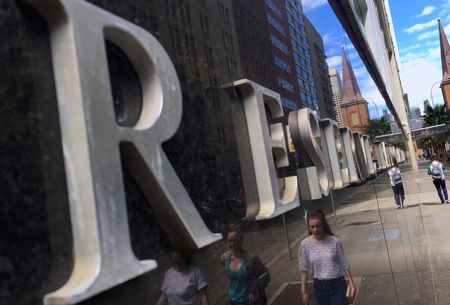SYDNEY, Feb 21 (Reuters) – Australia’s central bank, startled by the risk that inflation could prove stickier than previously thought, abandoned all thought of pausing at its February policy meeting and signalled more rate hikes would be needed in the months ahead.
Minutes of the Feb. 7 policy meeting out on Tuesday showed the Reserve Bank of Australia’s (RBA) Board only discussed two options – hiking by 50 basis points or 25 bps. That was a marked change from December when it had considered staying pat.
A pattern of upward surprises on inflation and wages had argued for the larger move, the minutes showed.
The Board settled on a quarter-point hike, which brought the cash rate to a fresh decade-high of 3.35%, noting an uncertain global outlook, the flexibility it has through the monthly meetings, and the already substantial increase in rates so far.
Rates have climbed 325 basis points since last May, easily the most aggressive tightening in modern history
“The recent inflation data had suggested more breadth and persistence in inflation than had been expected and that strong demand was leading to price increases in some parts of the economy,” the minutes said.
“While inflation was expected to decline, there was a risk that it could persist at an uncomfortably high level, which would entail longer term costs.”
Board members agreed that further increases in interest rates are likely to be needed over the months ahead, consistent with market pricing.
The hawkish turn surprised investors who sharply revised up the expected peak for interest rates to 4.2%, compared with 3.6% back in January.
At two parliamentary hearings last week, RBA Governor Philip Lowe doubled down on the consequence of not able to get inflation under control, warning that domestically sourced cost pressures were still picking up even if consumer price inflation as a whole may have finally peaked last quarter.
Inflation is running at a 32-year high of 7.8% and is only expected to slow to the top of the RBA’s target range of 2-3% by mid-2025. In particular, underlying inflation surprised to the upside in the December quarter.
Data out on Wednesday could help decide how much higher rates would have to go, with wage growth seen picking up to a fresh eight-year high of 3.5% in the fourth quarter last year. The RBA expects wage growth to top 4.2% by the end of this year.
(Reporting by Stella Qiu; editing by Wayne Cole)
Keywords: AUSTRALIA RBA/MINUTES

